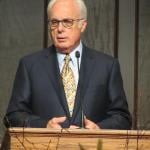Roy Gane’s detailed, technical Cult and Character is a sustained response to Jacob Milgrom’s claim that the purification offers of the Torah did not cleanse the worshiper who offered them but the sanctuary. Gane’s overall argument is convincing, and he makes a lot of intriguing exegetical points along the way. For instance, he compares the sprinkling of blood for purification offerings for the high priest with the sprinkling of blood in the Most Hols Place on the day of atonement. He... Read more
















